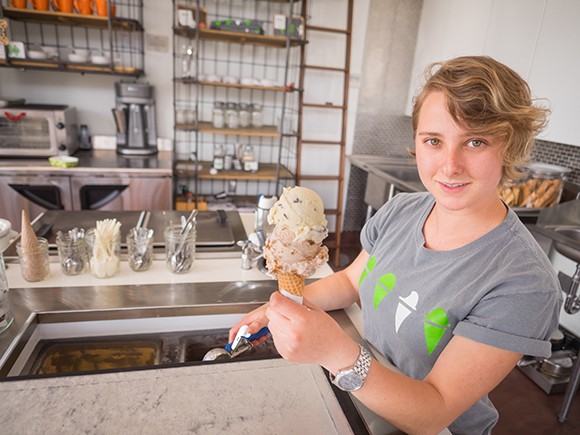
Rori’s employee Samantha Keyes-Levine prepares a double scoop ice cream cone at the creamery’s original Montecito location. (Nik Blaskovich / Business Times photo)
Ice cream parlors and barbershops are widely viewed as recession-proof businesses.
Rori Trovato, owner of Rori’s Artisanal Creamery, shares that view. But whether you’re selling haircuts or all-natural organic pints, figuring out the right way to grow is the hard part.
Three years ago, Trovato opened her first store, on Coast Village Road in Montecito. Rori’s makes all of its ice creams using organic ingredients such as farmer’s market or home-grown fruits and organic milk, cream and eggs.
Trovato and her husband devised a two-pronged strategy that included potentially lucrative distribution deals and retail locations. Now, though, they’re ditching distribution in favor of a retail-only strategy.
Not long ago, Rori’s was sold at Gelson’s Markets, Lazy Acres and Whole Foods. Other local outlets included Plow to Porch Organics in Santa Barbara, Los Olivos Grocery in the Santa Ynez Valley and Rainbow Bridge Natural Food and Knead Bakery Co. in Ojai.
Trovato thought she had found the path to expand her brand. The product was the right fit for the markets, but the lack of scale eventually forced Rori’s into a futile battle with slimming margins.
“The sales were high, but the profit was not,” Trovato said. “It just didn’t pay out. The costs for packaging and labor were just too much. To really get those costs down I would have had to invest in much bigger equipment and at least a lot more of it.”
McConnell’s Fine Ice Creams hold a dominant position in the regional market for high-end ice cream, but the company also has about a 70-year head start on Rori’s. In retail, however, competition from national chains such as Baskin Robins and Cold Stone Creamery is limited, as customers seek higher quality ingredients and locally made products. The rise of frozen yogurt has rattled the market share of ice cream some, but the legacy sweet treat isn’t going out of style anytime soon.
Trovato said she didn’t want to build out the distribution side of the business and wasn’t willing to put the capital into it for such low profit margins. Her two retail stores pull in about 24 times the sales revenue than the company’s current wholesale operation.

Rori’s Coast Village Road storefront in Montecito. (Nik Blaskovich / Business Times photo)
Rori’s still does business with local restaurants and hotels, including the Canary Hotel, Scarlet Begonia, Sama Sama Kitchen, the Bacara Resort & Spa and one other hotel in Los Angeles.
The company’s factory at 4191 Carpinteria Ave. in Carpinteria, formerly an industrial bakery for Jeannine’s restaurant and bakery, churns out about 400 pints of hand-packed ice cream per day. That number could easily double by the end of 2015, as the company is currently looking to scoop up a second factory location in the East Los Angeles area, with plans to open to two additional retail locations — one in the L.A. area and one in Orange County.
“We’re moving south,” Trovato said, adding that the target for the new production facility is the city of Commerce. “We want to be situated to serve Orange County and be able to get into San Diego.”
As for the new retail stores, Trovato said she isn’t afraid to rent a janitor’s closet as long as it’s in a prime location. Her location in Montecito is just 260 square feet, and the other in the Santa Barbara Public Market is just 150 square feet. In the beginning, Trovato opened such small spaces because that’s all the responsibility she wanted and all the company could afford, but now it’s part of the business model.
“I can get into some really high-end real estate if I only operate a small space,” she said. “If I only take 150 square and I can generate the kind of income I’m getting at the stores right now, it makes opening new locations really accessible.”
There’s just one issue: those tiny well-located properties are few and far between. Trovato said she’s having trouble finding spaces that are under 700 square feet.
“I actually had someone offer me an old ticket booth at a theater,” she said. “I would have taken it, but I have to be able fit six sinks in it.”
Even with the difficulties of finding the right real estate to squeeze into, Rori’s plans to have three more locations open by 2017. To help do this the company recently took on an equity partner, described as a Parisian with a background in ice cream, to the tune of $400,000.
“We had met through a mutual friend,” Trovato said. “He had been courting us for about a year and we finally took him on as a minority partner back in February.”
As a small company with a product that’s selling well, Rori’s is constantly approached by investors, Trovato said.
“A partnership is like a marriage, and up until now, most of them we’ve been approached by I wouldn’t want to have dinner with, let alone become business partners,” she said.






 Print
Print Email
Email
















